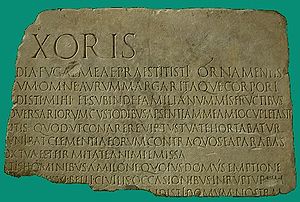- Curia (wife of Quintus Lucretius)
-
Curia or Turia or Thuria (ca. 60 BC – 5 BC) was a Roman woman from the Curio family.
Contents
Life
She was the wife of Quintus Lucretius Vespillo for 40 years, whom she married sometime between 49 BC and 42 BC. She was from a wealthy family as was her husband. They had no children. She so dedicated to her husband that when she couldn’t produce children, she offered to grant Quintus a divorce. He did not accept it and they remained married for the rest of their lives.
Turia was known for helping their female relatives that became of marrying age with financial assistance and other things as needed for their new marriage. These relatives otherwise would not have had these advantages that she provided the young brides.
Her loyalty and devotion to her husband was so rare that the other outlawed rebellions who had been proscribed by the triumvirs found themselves in disagreeable places, barely managing to escape inconceivable tortures, while Lucretius was safe in their bedroom in the arms of his gracious wife. She even went to extraordinary means playing the role of a woman that lost her husband in a battlefield someplace and he never returned. She would dress in old ragged clothing and be in unkept appearance. She even would put on a sad face with tearful eyes. This made everyone believe she lost her husband and he was nowhere to be found.[1]
Epitaph
Her husband writes in an epitaph on a large tombstone called "Laudatio Turiae" of her qualities,
- Why should I mention your domestic virtues, your loyalty, obedience, affability, reasonableness, industry in working wool, religion without superstition, sobriety of attire, modesty of appearance?
To this he adds that she was entirely devoted to the family structure and even avenged her parent's murder. He continues that her courage was incredible and that she confronted violence, legal trickery, brigandage, and political enmity with extraordinarily resolute and effective behavior. She was a univira : a one-man-woman.[2]
She is one of the three women mentioned by Valerius Maximus as examples of outstanding moral women. The other two were Tertia Aemilia and Sulpicia.
- When Quintus Lucretius was proscribed by the triumvirs, his wife Turia hid him in her bedroom above the rafters. A single maidservant knew the secret. At great risk to herself, she kept him safe from imminent death.[3]
See also
Notes
- ^ Valerius Maximus, Memorable Deeds and Sayings 6.7.1-3.L
- ^ Laudatio Turiae - praise of Turia
- ^ Valerius Maximus, Memorable Deeds and Sayings
References
Primary sources
- Appian, The Civil Wars, Book four - part 39
- Valerius Maximus, Memorable Deeds and Sayings 6.7.1-3.L
Secondary sources
- Shelton, J., As the Romans Did (1998)
- Treggiari, S., Roman Marriage (Oxford, 1991)
- Fantham, E. et al., Women in the Classical World (Oxford, 1994)
- Gardner, J., Women in Roman Law and Society (Bloomington, 1986)
- Lefkowitz, M.R. and M.B. Fant, Women's Life in Greece and Rome. A Source Book in Translation (Baltimore, 1992)
Categories:- Ancient Roman women
- 1st-century BC Romans
- 60 BC births
- 5 BC deaths
Wikimedia Foundation. 2010.

